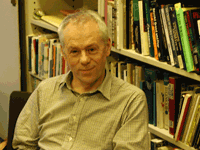Jonathan Edwards looks at ... us!
Olympic triple-jumper Jonathan Edwards has recently completed a series for BBC Radio 4, looking into the way science shapes and explains our world.
In the final programme in the series, Jonathan looks into Artificial Intelligence. A keen fan of science fiction, especially films like The Matrix, Jonathan wants to know how much science fact there is in fictional AI.
Jonathan visits the School of Informatics and gets a crash course on machine learning and voice synthesis.
He also discusses the convergence of biological and technological worlds, and hears about an intelligent system designed to help us deal more efficiently with emergencies.
After talking to Edinburgh philosopher, Andy Clark, about concepts of intelligence, he rounds off his day playing Connect Four with a talking, thinking, moving robot.
Having seen what AI can do, Jonathan emerges with renewed respect for a biological machine that’s all too often taken for granted - our own bodies.
Labels: ai, bbc, jonathan edwards, learning, music, planning, robotics, speech

